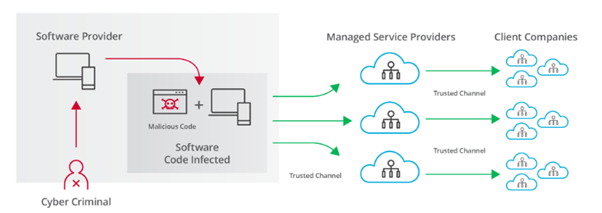In the evolving landscape of cyber threats, ransomware attacks draw international attention because of their severe impact. One critical area that is increasingly discussed is the vulnerability of the supply chain to ransomware, where an attack on one entity can quickly spread across its ecosystem of connected suppliers, partners, and customers.
Ransomware is malicious software that can be used to target both individuals and the organisations in which they work. The initial compromise of a network is often through an innocuous link that ultimately leads to ransomware being deployed that both encrypts crucial data and exfiltrates sensitive information, doubling the potential for damage. Once this happens, the attacker may demand payment in exchange for decrypting the data and promising not to leak stolen information. While paying the ransom might restore access, there are obviously no guarantees, and the reality is that affected businesses face significant ongoing risks to their data security.
A supply chain attack occurs when cybercriminals exploit weaknesses or vulnerabilities in one company to gain access to the data or systems of interconnected businesses. In the case of ransomware being used, the attack can compromise any data including data stored in third-party services such as cloud platforms, and the availability of services that depend on this data. Even when it’s an indirect attack, a disruption in the supply chain can result in operational delays, increased costs, and lost business as upstream problems affect downstream participants.
While many businesses acknowledge and attempt to counter the direct threat of ransomware, the impact of an attack on the supply chain is less recognized but equally significant. For instance, a ransomware attack on a key supplier which might cripple their ability to deliver essential services or products, will have direct consequences for those with a commercial attachment to them.
In 2021, Kaseya, a company that sells IT management software to Managed Service Providers (MSPs), reported that attackers had exploited a bug in their software to target their customers with ransomware. As Kaseya’s customers were MSPs and used the software to manage the networks of their own clients in turn, the clients of the MSPs were also victims of ransomware attacks. It has been reported that as many as 1500 downstream organisations were targeted. The supermarket chain Coop closed over 800 stores in Sweden when its payment systems were affected by ransomware – an attack that was two steps removed from Coop’s systems.
Software Provider Supply Chain Attack

Image credit: https://www.hbs.net/blog/how-software-supply-chain-attacks-work/
To safeguard against the threat of ransomware, organisations and their employees must adopt rigorous security measures. Proper due diligence is of paramount importance and organisations must both thoroughly vet new suppliers and regularly review the cybersecurity protocols of existing ones.
Regular audits to understand what data is shared with third-party vendors and assess the potential risks attached to the relationship can contribute to the safety of a supply chain. However, cyber security audits must be baked into the DNA of every organisation: it is vital for each business to ‘own’ its security and understand the risks it faces. While this approach will protect an individual company, it also has the corollary benefit of contributing to the collective security of the whole ecosystem.
Services offered by specialists such as GSA Global can help to assess your business’ exposure to cyber risk, quantifying the potential damage to your systems and data, and lead to the creation of mitigation strategies which can ensure both your and your suppliers’ systems are as secure as possible against ransomware threats.
Understanding the intertwined nature of your business operations and supply chain vulnerabilities is crucial for every organisation. By taking proactive steps, companies can not only shield themselves from direct cyberattacks but also fortify their defences against the domino effects that an attack elsewhere in their supply chain may cause.
The key to cyber security is comprehensive preparation and continuous vigilance in what is a globally interconnected and digitally dependent business environment.
If you want to know more about GSA Global’s work in this space and how we might support your business to make it safer and more secure, then please do get in touch.



